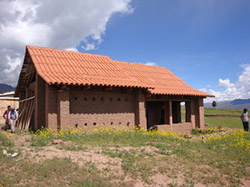May 13 2009
A team of students from Rensselaer Polytechnic Institute will be spending part of the summer designing and starting to build solar-powered pasteurization systems for communities in rural Peru.
 A team of Rensselaer students won funding and will spend part of the summer developing a new solar-powered pasteurization system for use by rural communities in Peru
A team of Rensselaer students won funding and will spend part of the summer developing a new solar-powered pasteurization system for use by rural communities in Peru
The group of engineers, led by Assistant Professor Lupita D. Montoya, was one of four student teams nationally to win a highly competitive Summer Engineering Experience in Development (SEED) grant from nonprofit volunteer organization Engineers for a Sustainable World (ESW).
The project aims to help the Langui and Canas community in southern Peru by developing affordable, solar-powered pasteurization equipment. Many families in the region have dairy cows and produce milk, yogurt, and cheeses on a small scale, but cannot obtain certification to market these products because they lack proper sanitation equipment. The new pasteurization systems will allow these families to meet governmental regulations and begin selling their dairy products and earning additional income.
“Currently farmers make dairy products for personal consumption and trade with neighbors. During our first trip people told us that they were looking to sell products beyond their town but needed certification,” said team member Tara Clancy, an environmental engineering major at Rensselaer who graduates this week. “Obtaining certification will enable farmers to strengthen their economic independence, but they won’t be able to be certified without direct access to water, energy, and sanitary facilities. That’s where we can start to implement appropriate technologies.”
This summer, Montoya, Rensselaer mechanical engineering doctoral student Erin Lennox, and rising junior Anna Cyganowski will volunteer their time in Langui and Lima, Peru. Along with working on the design and engineering of pasteurization devices, they will partner with students from the Pontificia Universidad Católica del Perú (PUCP) to investigate the social and economic aspects of creating a dairy enterprise. This effort will include examining how the community currently produces dairy products, looking into local manufacturing regulations, and studying the local marketplace. The student team also plans to work with microfinance experts in Peru to make small loans to families to purchase the equipment and improve facilities. A student supported by the Office of the Vice Provost for Entrepreneurship at Rensselaer will also join this team.
“The villagers in the region stated their interest in selling dairy products at the larger markets, but they also recognize that they lack the appropriate technologies and conditions needed to achieve certification,” Lennox said. “It will be exciting and challenging for us to apply our engineering know-how to help them attain this important goal.”
“It’s rewarding to be involved with a real-world project and know that your hard work can have a direct positive impact on not just one person, but an entire community,” Cyganowski said.
The project builds on past humanitarian engineering work by Montoya to challenge students to develop new, affordable technologies to help improve the quality of life in rural Peru. These student innovations are currently installed or housed in the project flagship Ecological Home for the Andes, which serves as a community training site in Langui and aims to showcase the technologies for nearby communities.
The students hope to have their new pasteurization system designed, operational, and in place at the Ecological Home for the Andes in one year.
“This wonderful group of students clearly realizes their own potential,” Montoya said. “Often our students are reminded of the rich history of this institution, but these students are now making their own history, one that is more inclusive and in-tune with our present challenges. They are not just smart; they have the courage to take on big challenges and the determination to engineer solutions and implement them in ways that make a difference in the world beyond Rensselaer.”
Along with Rensselaer, the other ESW SEED grant winners were Stanford University, the University of California Berkeley, and Purdue University. Founded in 2001, the ESW is “an engaged technical community with the vision of changing the world through engineering education, innovation, and practical action,” and seeks to stimulate and foster an increased and more diverse community of engineers, as well as infuse sustainability into the practice and studies of every engineer.
For more information on Montoya’s sustainable engineering research, visit: http://www.eng.rpi.edu/magazine/img/sp07/pdf/sp07_pdf_montoya.pdf